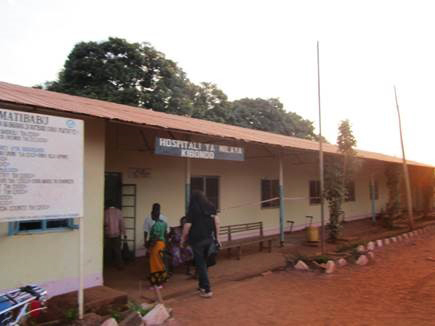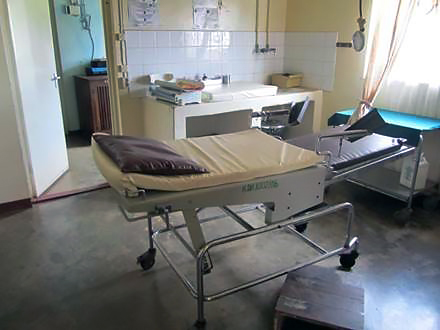You are here
Saving Lives in Tanzania
 In mid April, we had the incredible opportunity to travel to Tanzania with some of our colleagues from the U.S. Centers for Disease Control and Prevention (CDC) to make logistical decisions for the third phase of a family planning and maternal health project funded by Bloomberg Philanthropies. Alongside the World Lung Foundation and Engender Health, CDC has been an implementing partner on this project since 2010. To date, the work led by Bloomberg has been implemented in three regions in Tanzania (Morogoro, Pwani and Kigoma). The results of the 2014 CDC-supported Reproductive Health Survey in Kigoma indicate that region has some of the greatest need for maternal and child health services in the country; therefore, the third phase will have partners focusing efforts on Kigoma. CDC’s role will be to evaluate the efficacy of the project’s programmatic activities to strengthen family planning and obstetric care in health facilities in Kigoma. CDC’s involvement is a testament to Bloomberg Philanthropies’ commitment to being guided by data.
In mid April, we had the incredible opportunity to travel to Tanzania with some of our colleagues from the U.S. Centers for Disease Control and Prevention (CDC) to make logistical decisions for the third phase of a family planning and maternal health project funded by Bloomberg Philanthropies. Alongside the World Lung Foundation and Engender Health, CDC has been an implementing partner on this project since 2010. To date, the work led by Bloomberg has been implemented in three regions in Tanzania (Morogoro, Pwani and Kigoma). The results of the 2014 CDC-supported Reproductive Health Survey in Kigoma indicate that region has some of the greatest need for maternal and child health services in the country; therefore, the third phase will have partners focusing efforts on Kigoma. CDC’s role will be to evaluate the efficacy of the project’s programmatic activities to strengthen family planning and obstetric care in health facilities in Kigoma. CDC’s involvement is a testament to Bloomberg Philanthropies’ commitment to being guided by data. 
After nearly 20 hours of travel, we were excited to arrive in Dar es Salaam and make our way to our hotel for some rest. The taxi ride from the airport gave us a glimpse of the juxtaposition of modern and tradition that is Dar, as did our walk along the harbor the following day. During most of our time in country, though, we were at the CDC Tanzania office where the three-day meeting was held.
The objective of our trip was to determine project targets and to develop a joint work plan outlining how partners, in strong partnership with the Tanzanian Ministry of Health, will achieve them. Throughout the course of the discussion, we had various MOH leaders join us and participate in the conversations, including Dr. Leonard Subi, the Medical Director for the Kigoma region. The involvement of the Tanzanian government in this early planning stage allows partners to understand Kigoma Regional Government’s plans for maternal and reproductive health and identify opportunities and gaps to guide project programming over the coming four years.
 On the first day of the meeting, our CDC colleagues kicked off the conversation by presenting data collected in surveys implemented during the second phase of the project. The importance of CDC’s work and the scientific objectivity that our CDC colleagues bring to any partnership was clear. Other topics of conversation included an update on in-country advocacy efforts, communications campaigns and mobile technology as modes to raise public awareness on the topics of family planning and obstetric care, and community healthcare worker training. On the final day, discussions from the previous days’ informed the joint project work plan created by all partners.
On the first day of the meeting, our CDC colleagues kicked off the conversation by presenting data collected in surveys implemented during the second phase of the project. The importance of CDC’s work and the scientific objectivity that our CDC colleagues bring to any partnership was clear. Other topics of conversation included an update on in-country advocacy efforts, communications campaigns and mobile technology as modes to raise public awareness on the topics of family planning and obstetric care, and community healthcare worker training. On the final day, discussions from the previous days’ informed the joint project work plan created by all partners.
It was invigorating to be on the ground participating in the architecture of a public-private partnership. On our final night in Tanzania, before meeting up with the rest of our colleagues, we decided to grab a quick dinner and debrief on the day's discussions. We were served by a young woman named Jacqueline. As she was serving us, Jacqueline politely inquired as to where we were from. We told her we were from the United States and that we were working with CDC to help improve the medical care for women and their babies. Through the course of the conversation, we learned that Jacqueline's first baby had died at birth and that she had almost died as well. She told us that she knew a lot of women who had also experienced that loss.
That day's presentations and discussions had made clear the significant challenges that lie ahead. But on a day of hearing many difficult statistics, talking with Jacqueline helped us remember that this project is about women like her and their babies. In our work from Atlanta to address the burden of maternal and neonatal mortality in Tanzania, we rarely encounter the emotional toll that these deaths have on the families. Jacqueline’s story made this toll very real to us, serving as a reminder that the work we do matters.
